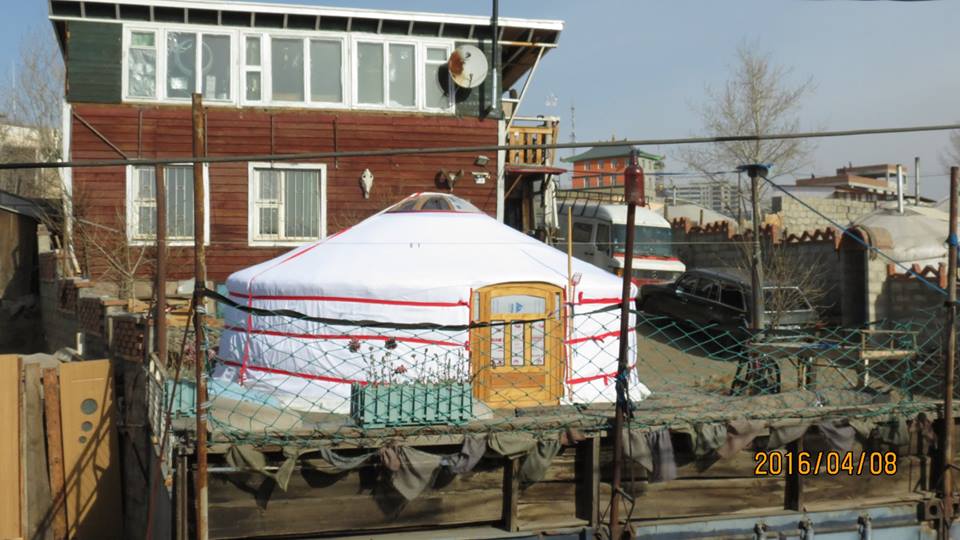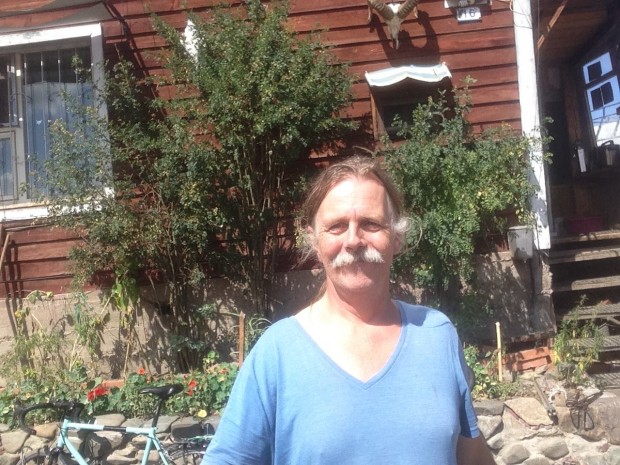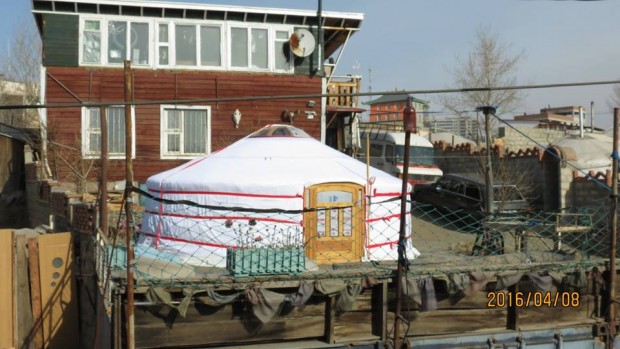
Finding home in the ger district
Alexander McNab – The UB Post
Ulaanbaatar is a city known as a cemetery of nomadism, a place where wandering people have gone to settle down inside four cement walls in towering apartment blocks, but for Froit van der Harst, the entrance into U.B. was only a continuation of over a decade of placeless-ness.
After working on a cruise ship and spending 10 years moving his yurt across Europe, van der Harst says, “I don’t care so much about home anymore. I’ve been to too many places.”
Van der Harst spent his first 10 years in Mongolia battling against the permanency of the residential design of the capital city, moving around from room to room in the built area of the city.

It was paradoxically only after moving to a neighborhood whose very namesake is nomadic that van der Harst finally found himself settled.
“We are now breaking the record,” van der Harst says of his khashaa (property) in the ger district. “Before, I never stayed nine years in one house.”
He lives on a dead end street on Gandan’s Lower East Side behind a khunsnii delguur (grocery store) and a walled-in canal where he dumps his dirty water.
Drunks and dogs loiter lackadaisically on the trashy dirt road outside, the latter clutter the empty silence of the night with unending barks.
Although van der Harst is originally from Netherlands, the story of how he arrived in the ger district is, actually, quite Mongolian. Economic necessity drove van der Harst away from his itinerant existence, and so he sought out a spot on the city’s gritty edge to start a new life and a new business.
Van der Harst makes yurts. His company, Euro-Yurts LLC, was founded in 2007, the same year he moved to the ger district. Euro-Yurts manufactures and exports Mongolian-style yurts to Europe, an enterprise that van der Harst decided to center at his home in Tuul 1 ger area. A wooden sign above his door advertises the business.
The ger district, he explains, was the only place suitable for his company headquarters. A large pit that he dug in his khashaa holds three shipping containers, which he uses for company storage. The second floor of the two-story, wooden house he created is his workshop. His yard is just large enough and flat enough to pitch his biggest yurt for his customers and still allow them room to walk around it.
The space and convenience of van der Harst’s ger district property can never be replicated by an apartment.
Van der Harst knows though that, to many people, his choice of neighborhood may seem odd, amazing even.
“‘Wow. Wow. Wow. Wow. You live there,’” Mongolian people often say to him.
“‘Gotta live somewhere,’” he replies.
Crime, poverty, and lack of infrastructure keep many of the city’s foreign and native residents from even visiting the ger district, and van der Harst is well aware of these challenges. After all, though he is only a few steps from the pavement of Ikh Toiruu, he has to live with dirt road district problems.
“You live without running water. We have walking water,” van der Harst says. “I’m moving water all the f**king time in all different states, and it’s a daily thing. People in a house don’t think about that.”
Van der Harst and his Mongolian wife Bolor Balchindorj collect rainwater during the summer and at least once a week visit one of the many local pump houses to buy even more clean water.
The rainwater they use for showering and laundry. The shower has to be filled from buckets just before and just after it’s used. During wintertime, they bathe about once a week at a communal wash house.
Two to three times a year, van der Harst is burgled.
In the ger district, the fresh smell of wind after the rain is sacrificed to flooded pit toilets that overflow and release a fecal stench into the already polluted ger area air.
He hears babies crying from sugar withdrawal.
The ger district, he explains, is not a district. It’s a slum, a disgrace, he says.
“It’s sh*t, but it’s the reality,” van der Harst says. “But we also have a lot of freedom. I can play my music as loud as I want. I can pee in the neighbor’s garden.” He laughs. “They won’t even notice.”
Van der Harst believes that most people are too hard on the ger district, exaggerating its deficiencies so much that they cannot recognize the beauty of its community.
“70 percent [of people in the ger district] are hard-working people trying to get by, trying to get out of here, but at the same time, they love their piece of land with the basketball ring,” he says. “People are painting their fences on the outside, which is a sign… We’re all poor… But the people wash themselves, and they have jobs, and they take care of the streets and the dogs and the babies.”
Van der Harst knows the people, his neighbors, other folks struggling through the annually broken government promises of heating and sewage before the end of the summer.
In the khashaa next door, a woman in her forties sells cigarettes and chewing gum on the side of the road. Her grandmother lives on state pension. The grandfather is in the countryside, tending horses perhaps.
There was a family that was here for six months. They came to the city to have a baby. They’ve gone now.
Two to three of the families on the other side don’t work. They’re all living on welfare.
Van der Harst knows his neighbors, but he doesn’t connect with them.
“This community is made of tenants,” he explains. “These people come and go.”
Also, there is a language barrier. No one in his community speaks English, and van der Harst admits that his Mongolian is very bad.
However, even if they could speak to each other, van der Harst feels that they wouldn’t have much to say.
“You have to understand these people have no education,” he says. “They don’t know anything relevant for a conversation except for the weather and the bus routes have changed.”
In fact, van der Harst feels that, perhaps, the most common thing about him and his fellow ger district residents is their location. His neighbors don’t know what he does or why he lives there. They only ever speak to him to ask to borrow his tools.
He calls them orcs, a term derived from the name of the goblin-like creatures in J.R.R. Tolkein’s fantasy trilogy “The Lord of the Rings”. It is commonly used by some Mongolians to derogatorily describe people from the countryside.
“You wanna go have dinner with an orc,” van der Harst asks rhetorically, explaining the exclusion of himself from his neighbors.
Van der Harst says that his neighbors perhaps have learned something from him, passing by and looking at the straightness of his house’s walls, seeing how his door closes and locks with a key, but he doubts that they’ve noticed.
“Orc people are always very busy being orcs,” he says.
Van der Harst doesn’t feel that he has been enriched at all by his community.
“They never swept my street,” he says. “I’m the only one in the whole street with a broom.”
Nevertheless, van der Harst says “this neighborhood is mine… I’ll stay here and, maybe, die here.”
In spite of the fact that van der Harst doesn’t have too much of a connection to homes, he works to make his plot of land feel like his own.
He has a sofa, where in the afternoon he takes naps. He rebuilt the second floor of his home and will redesign his house again when he gets heating and sewage. He has installed an indoor toilet, plans to create an indoor shower. He’s made a doorbell, a light above the entrance, a black flag with the letter “Ф” flies above his rooftop.
He gardens tomatoes, cress, tobacco, sunflowers, and buckwheat. This summer, he found a worm.
“That’s a super good sign. I mean, could you be happy seeing a worm?” he asks. “I saw a worm in my garden, and I didn’t bring that worm myself. It chose to live there.”
As van der Harst speaks, I think that this worm isn’t too different from him. He, a foreigner, chose to live here in this country, in this city, in this slum. Maybe, that’s a good sign too.
The darkness has enveloped the monastery’s lower east side. Van der Harst catches me looking out at the landscape of city lights, twinkling not so far off in the distance.
He says something like “it’s beautiful, isn’t it?”.
“The view from my apartment is just of another apartment,” I confess.
“They don’t know what they’re missing,” van der Harst says of apartment people. “They don’t know.”




One thought on “Finding home in the ger district”
why did you give this racist old man a public speaking forum?